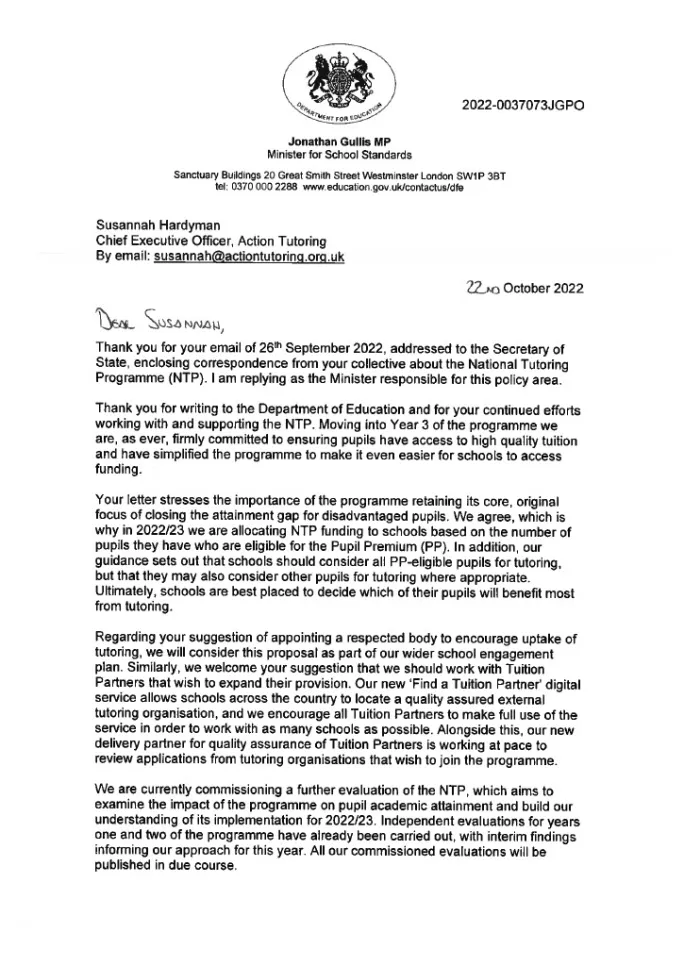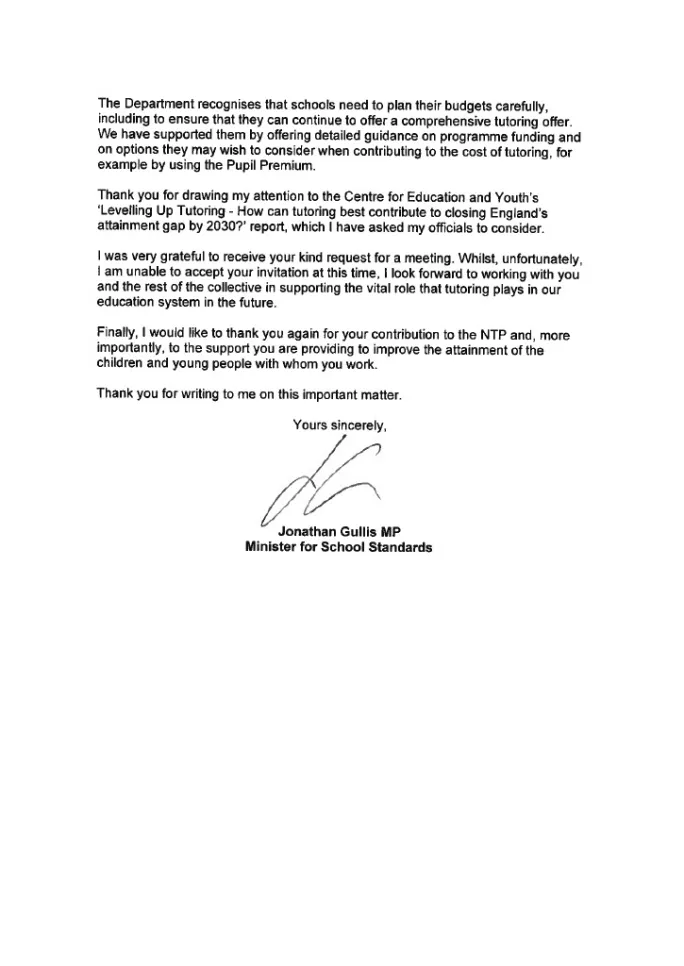Exclusive: DfE looks at increasing catch-up cash

Extended funding and improved targeting of disadvantaged pupils are among proposals in a report being considered by Department for Education officials to improve the National Tutoring Programme, Tes has learned.
The appointment of a “respected body” to encourage greater school uptake of the programme to help pupils catch up on lost learning is also under consideration, according to a letter sent to a tutoring boss over the weekend.
The news that officials would consider proposals that the DfE has been urged to adopt to improve the NTP emerged in a letter, seen by Tes, that was sent by school standards minister Jonathan Gullis to Susannah Hardyman, CEO of Action Tutoring, which is a tutoring provider on the programme.
- Background: Miss tutoring form deadline and we’ll reclaim cash, DfE tells heads
- National Tutoring Programme: Catch-up tutors run lessons for “ghost pupils”
- Catch-up: Education secretary warned of attainment gap “travesty”
Mr Gullis was responding to a letter delivered to former education secretary Kit Malthouse last month from 14 tutoring organisations, which called for “urgent” changes to the government’s flagship catch-up programme.
In the letter, reported exclusively by Tes in September, the organisations involved in the NTP, including Action Tutoring, warned they had “serious concerns” that the scheme risked widening the attainment gap.
As well as making a series of demands, they encouraged the education secretary to read a report produced by the Centre for Education and Youth, Levelling Up Tutoring - How can tutoring best contribute to closing England’s attainment gap by 2030?
Demands to improve the National Tutoring Programme
This report made several suggestions, including telling policymakers to immediately commit to an additional year’s funding for the programme up to 2025 and “maintaining a simple approach to reporting and accountability that focuses on disadvantaged pupils”.
In his response to the letter, Mr Gullis said: “Thank you for drawing my attention to the Centre for Education and Youth’s Levelling Up Tutoring - How can tutoring best contribute to closing England’s attainment gap by 2030? report, which I have asked my officials to consider.”
In response to another suggestion in the tutoring organisations’ letter, that the DfE appoint a respected body to lead large-scale engagement with the teaching profession to persuade schools to take up tutoring, Mr Gullis said the DfE would “consider this proposal as part of our wider school engagement plan”.
However, he rejected a meeting with the providers, and rejected other concerns highlighted by the tutoring providers.
Responding to a suggestion that pupil premium participation targets be reinstated, Mr Gullis said the DfE was allocating money to schools based on the number of pupils they have who are eligible for the pupil premium.
He added: “In addition, our guidance sets out that schools should consider all PP-eligible pupils for tutoring, but that they may also consider other pupils for tutoring where appropriate.
“Ultimately, schools are best placed to decide which of their pupils will benefit most from tutoring.”
In response to another suggestion, that the subsidy level for the NTP be raised next year, Mr Gullis wrote: “The department recognises that schools need to plan their budgets carefully, including to ensure that they can continue to offer a comprehensive tutoring offer.
“We have supported them by offering detailed guidance on programme funding and on options they may wish to consider when contributing to the cost of tutoring, for example by using the pupil premium.”
Nick Bent, CEO of NTP tuition provider The Tutor Trust and one of the signatories of the letter, said it was “disappointing” that Mr Gullis had rejected the chance to meet and that he hoped for an “urgent opportunity to meet ministers in person to discuss how to maximise the success of NTP, especially in ‘cold spot’ areas for social mobility”.
He described recent evidence of a widening disadvantage-related attainment gap as “scary” and said this - as well as regional divides in attainment - showed that the NTP is “needed more than ever, and we need DfE to deliver its promise of a major marketing campaign to schools”.
The NTP has undergone a series of changes this year, with the DfE announcing in March that £349 million of tutoring cash would go directly to schools from the next academic year.
This was in a bid to “simplify” the system after the DfE finally decided to end its contract with Dutch firm Randstad, which had struggled to meet targets. Three new contracts were introduced as part of the changes.
Funding for the NTP is set to reduce gradually over the next two years.
The DfE said it will fund 60 per cent of the total cost incurred by a school to deliver tutoring in the current academic year. Last year the subsidy was 75 per cent, and next academic year it will drop further to 25 per cent before being phased out.
The full letter sent by Mr Gullis can be seen below:


Register with Tes and you can read two free articles every month plus you'll have access to our range of award-winning newsletters.
Keep reading with our special offer!
You’ve reached your limit of free articles this month.
- Unlimited access to all Tes magazine content
- Save your favourite articles and gift them to your colleagues
- Exclusive subscriber-only stories
- Over 200,000 archived articles
- Unlimited access to all Tes magazine content
- Save your favourite articles and gift them to your colleagues
- Exclusive subscriber-only stories
- Over 200,000 archived articles
topics in this article



